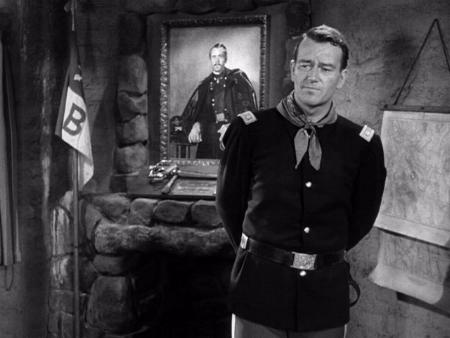Fort Apache, Iraq and Viet Nam
John Ford won more Best Picture Oscar's than any other director. He won them for The Informer (1935), The Grapes of Wrath (1940), How Green Was My Valley (1942) and The Quiet Man (1952). He also won an Oscar for Best Documentary, Short Subject for The Battle of Midway (1942) and an Oscar for Best Documentary for December 7th (1943).
 In 1948, John Ford made Fort Apache. It was to be followed by She Wore a Yellow Ribbon (1949) and Rio Grande (1949). Together they have been referred to as his Calvary Trilogy. Fort Apache, while considered by most to be a good movie, is not considered to be a great movie. I think I have to take issue with that. One of the reasons that Fort Apache has been dismissed by critics is because it is seen as a retelling of the Custer story, just moved further to the West with a different Indian tribe. I think that Ford deliberately drew parallels to the Custer story and the America's place in the world after WWII. Ford was pointing to the dangers of arrogance, hubris and national pride. He may also have been very prophetic in warning against the dangers of the developing military-industrial complex that President Eisenhower would refer to thirteen years later in his Farewell Address.
In 1948, John Ford made Fort Apache. It was to be followed by She Wore a Yellow Ribbon (1949) and Rio Grande (1949). Together they have been referred to as his Calvary Trilogy. Fort Apache, while considered by most to be a good movie, is not considered to be a great movie. I think I have to take issue with that. One of the reasons that Fort Apache has been dismissed by critics is because it is seen as a retelling of the Custer story, just moved further to the West with a different Indian tribe. I think that Ford deliberately drew parallels to the Custer story and the America's place in the world after WWII. Ford was pointing to the dangers of arrogance, hubris and national pride. He may also have been very prophetic in warning against the dangers of the developing military-industrial complex that President Eisenhower would refer to thirteen years later in his Farewell Address.
In Fort Apache, the Custer-like figure, Col. Thursday, played by Henry Fonda serves to personify the dangers inherent to America in the immediate post-WWII years. Col. Thursday had been a general during the Civil War and was looking to regain some of the glory, prestige and power he had during that time. Some of his quotes show his disillusionment at being sent to the frontier post a Fort Apache.
"At the end of the rainbow, Fort Apache. Fort Apache. Blast an ungrateful War Department that sends a man to a post out here".
The racist and class conscious Col. Thursday who can't tell an O'Rourke from an O'Brien or a Murphy, has little respect for the enemy that he has been sent to fight.
Col. Thursday : "We here have little chance for glory or advancement. While some of our brother officers are leading their well publicized campaigns against the great Indian nations, the Sioux and the Cheyennes, we are asked to ward off the gnat stings and flea bites of a few cowardly digger Indians.
Captain York : "You would hardly call Apaches digger Indians, sir."
Col. Thursday : "You'd scarcely compare then with the Sioux, Captain."
Captain York : "No I don't. The Sioux once raided into Apache territory. Old Timers told me you could follow the lines of their retreated by the bones of their dead."
Col. Thursday : "I would suggest that the Apache has deteriorated since then, judging by a few of the specimens I've seen on my way out here".
Rather than take the advice of the experts in the field, Thursday, being in a position of power, jumps to conclusions that serves his own purposes as he vainly searches for glory.
Ford makes a point of showing how well Col. Thursday is aware of the "trap as a military weapon", and yet he himself falls into the Apache trap because of his hubris and racism. He "knew" he was not facing Alexander the Great, Robert E. Lee or Genghis Khan, just some "cowardly digger Indians".
There are many lessons to be learned in the movie Fort Apache. It probably should be required viewing for members of our government and military so we don't keep making the mistakes we have made in the past.
|

